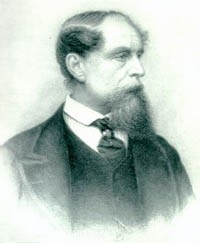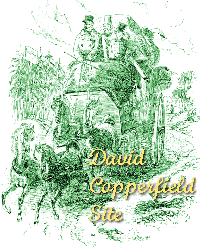|
|
"Never Has A Man So Embodied The Spirit Of The Age". |

In speaking the above words, the British author,
Peter Ackroyd, perfectly sums up everything that Charles Dickens was and is.
Charles Dickens was born in Landport, Hampshire.His father was a clerk in the navy pay office, who was well paid but
often ended in financial troubles. In 1814 Dickens moved to London, and then to Chatham, where he received some education.
He worked in a blacking factory, Hungerford Market, London, while his family was in Marshalsea debtor's prison in 1824 - later
this period found its way to the novel Little Dorrit (1855-57). In 1824-27 Dickens studied at Wellington House Academy, London,
and at Mr. Dawson's school in 1827. From 1827 to 1828 he was a law office clerk, and then worked as a shorthand reporter at
Doctor's Commons. He wrote for True Son (1830-32), Mirror of Parliament (1832-34) and the Morning Chronicle (1834-36). He
was in the 1830s a contributor to Monthly Magazine, and The Evening Chronicle and edited Bentley's Miscellany. In the 1840s
Dickens founded Master Humphrey's Cloak and edited the London Daily News.
These years as a journalist left Dickens with lasting affection for journalism and suspicious attitude towards unjust
laws. His sharp ear for conversation helped him reveal characters through their own words. Dickens's career as a writer of
fiction started in 1833 when his short stories and essays to appeared in periodical. His SKETCHES BY BOZ and THE PICKWICK
PAPERS were published in 1836; he married in the same year the daughter of his friend George Hogarth, Catherine Hogart. However,
some people suspected that he was more fond of her sister, Mary, who moved into their house and died in 1837. Dickens requested
that he be buried next to her when he died and wore Mary's ring all his life. Another of Catherine's sisters, Georgiana, moved
in with the Dickenses, and the novelist fell in love with her. Dickens had with Catherine 10 children but they were separated
in 1858. Dickens also had a long liaison with the actress Ellen Ternan, whom he had met by the late 1850s
The Pickwick Papers were stories about a group of rather odd individuals and their travels to Ipswich, Rochester, Bath
and elsewhere. Dickens's novels first appeared in monthly instalments, including OLIVER TWIST (1837-39), which depicts the
London underworld and hard years of the foundling Oliver Twist, NICHOLAS NICKELBY (1838-39), a tale of young Nickleby's struggles
to seek his fortune, and OLD CURIOSITY SHOP (1840-41). Among his later works are DAVID COPPERFIELD (1849-50), where Dickens
used his own personal experiences of work in a factory, BLEAK HOUSE (1852-53), A TALE OF TWO CITIES (1859), set in the years
of the French Revolution. GREAT EXPECTATIONS (1860-61), the story of Pip (Philip Pirrip), was among Tolstoy's and Dostoyevsky's
favorite novels. The unfinished mystery novel THE MYSTERY OF EDWIN DROOD was published in 1870.
From the 1840s Dickens spent much time travelling and campaigning against many of the social evils of his time. In addition
he gave talks and reading, wrote pamphlets, plays, and letters. In the 1850s Dickens was founding editor of Household World
and its successor All the Year Round (1859-70). In 1844-45 he lived in Italy, Switzerland and Paris. He gave lecturing tours
in Britain and the United States in 1858-68. From 1860 Dickens lived at Gadshill Place, near Rochester, Kent. He died at Gadshill
on June 9, 1870.
Although Dickens's career as a novelist received much attention, he produced hundreds of essays and edited and rewrote
hundreds of others submitted to the various periodicals he edited. Dickens distinquished himself as an essayis in 1834 under
the pseudonym Boz. 'A Visit to Newgate' (1836) reflects his own memories of visiting his own family in the Marshalea Prison.
In 'A Small Star in in the East' reveals the working conditions on mills and 'Mr. Barlow' (1869) draws a portrait of a unsensitive
tutor.

It will be easily believed that I am a fond parent to every child of my fancy, and that no one can ever love that
family as dearly as I love them. But, like many fond parents, I have in my heart of hearts a favourite child. And his name
is David Copperfield.
Charles Dickens, from his preface to David Copperfield

|
| . |
He [Mr. Micawber] solemnly conjured me, I remember, to take warning by his fate; and to observe that if a man had twenty
pounds a-year for his income, and spent nineteen pounds nineteen shillings and sixpence, he would be happy, but that if he
spent twenty pounds one he would be miserable.
O Agnes, O my soul, so may thy face be by me when I close my life indeed; so may I, when realities are melting from me,
like the shadows which I now dismiss, still find thee near me, pointing upward!
-David Copperfield
![Dickens and his characters[click for larger image]](sitebuildercontent/sitebuilderpictures/.pond/chairanddickens.jpg.w300h220.jpg)
|

